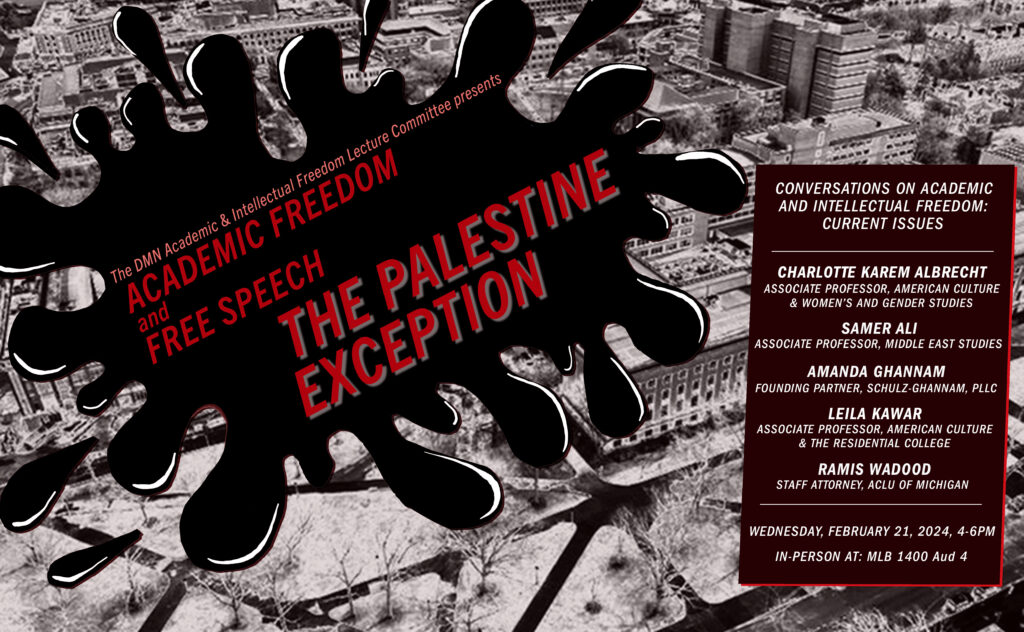The DMN Academic and Intellectual Freedom Lecture Committee will be hosting the first panel in a series titled Conversations on Academic and Intellectual Freedom: Current Issues to be held on Wednesday Feb. 21st, 4pm-6pm in MLB 1400 Aud 4.
Moderator:
Charlotte Karem Albrecht, Associate Professor of American Culture and Women’s and Gender Studies
Presenters:
Leila Kawar, UM AAUP Chapter, “External Harassment and Proactive Strategies for Protecting the Academic Freedom of Faculty”
Amanda Ghannam, Founding Partner at Schulz-Ghannam, PLLC.
Ramis Wadood, ACLU of Michigan, “Students’ Right to Free Speech and Protest.”
Samer Ali, Moderator, UM Academic Freedom Network, “How Did We Get Here? Structural Factors that Erode Academic Freedom”

Registration
In-person
Modern Language Building, first floor
room 1400, Auditorium 4
Register for In-Person Attendance Here
Virtual
Zoom Webinar (Requires umich.edu credentials)
Register for Virtual Attendance Here
Academic Freedom and Free Speech: The Palestine Exception
Academic Freedom and Free-Speech issues on college campuses have increasingly made headlines as Faculty, staff, and students have been increasingly sanctioned based on intra- and extra-mural speech on issues such as critical race theory, LGTBQ rights, etc. and state legislatures pass gag orders targeting “discussions of race, racism, gender, and American history, banning a series of “prohibited” or “divisive” concepts for teachers and trainers operating in K-12 schools, public universities, and workplace settings.” Sanctions, firings and reneging or non-renewal of employment contracts is nothing new when it comes to Palestine-related speech. Chandler Davis, one of the three men who inspired the annual Davis, Markert, Nickerson Lecture on Academic and Intellectual Freedom, wrote referring to McCarthyism of his times: “There is one effect that looks very similar. In the 1950s any untenured academic might be leery of signing a petition critical of the US fighting a war in Korea (to take one example), knowing it would be vulnerable to public attack. The same went for critical examination of the capitalist system. In the present period, criticism of the Israeli treatment of the Palestinians is subject to the same chill.” Legal scholars have referred to it as the “Palestine Exception.” The ongoing bloodshed and massive humanitarian crisis in the Middle East since October of 2023, as we have seen, has led to an increase in censorship and heightened the stakes.
In light of sanctions against faculty and staff – including dismissals – nationally, external harassment of students, faculty, and staff locally, this panel brings together a group of experts and concerned faculty to discuss general principles of academic freedom and First Amendment rights of our campus community, as well as internal and external pressures that result in censorship and self-censorship. Its aim in doing so is to place free speech policies in context.
